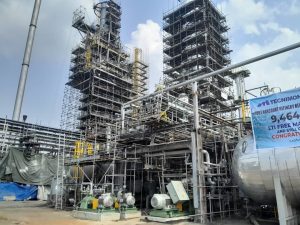Senate Investigates $1.5 Billion for Port Harcourt Refinery
The Nigerian Senate has launched an investigation into the $1.5 billion allocated for the rehabilitation of the Port Harcourt Refinery. Concerns have arisen over the lack of significant progress despite the substantial investment. The probe, led by the Senate Ad Hoc Committee on Alleged Economic Sabotage in the Nigerian Petroleum Industry, aims to uncover the reasons behind the underwhelming results of the project.

Background of the Refinery
In 2021, the Federal Executive Council approved the substantial sum for the turn-around maintenance of the Port Harcourt Refinery. This facility has been plagued by inefficiencies and a lack of maintenance for decades. The refinery, with a combined capacity of 210,000 barrels per day, was expected to return to near-full operational capacity following the rehabilitation. However, the Senate’s investigation highlights that the expected outcomes have not been realized.
Senate’s Concerns
Senator Opeyemi Bamidele, Chairman of the Ad Hoc Committee, expressed his dismay during a stakeholder meeting in Abuja. He emphasized the unfairness of neglecting public enterprises while private businesses continue to thrive. “It is unjust and inappropriate to overlook public companies while private enterprises prosper,” Bamidele stated. He recalled the Federal Executive Council’s approval of the $1.5 billion plan by the Ministry of Petroleum Resources in 2021, questioning why the investment has not yielded significant returns.
Challenges Faced
The Port Harcourt Refinery, located in the oil-rich Niger Delta region, has been operational since 1965. It is the oldest and largest of Nigeria’s three government-owned refineries. Despite its potential, the refinery has been operating at a fraction of its capacity due to inefficiencies and lack of maintenance. This has led to Nigeria, Africa’s largest crude producer, relying heavily on imported refined petroleum products.
Response from NNPCL
In response to the Senate’s concerns, Mele Kyari, Group Chief Executive Officer of Nigerian National Petroleum Company Limited (NNPCL), refuted claims of sabotaging domestic refineries. He asserted that the NNPCL has made significant progress, transforming from a loss-making entity for 43 years to a profit-making company today. Kyari also addressed the media attacks on his person and the institution, describing them as deliberate and calculated efforts to create a negative impression.
Future Prospects
Despite the assurances from NNPCL, the Senate remains skeptical. The investigation aims to hold accountable those responsible for the management of the $1.5 billion allocated for the refinery’s rehabilitation. The Senate’s probe comes at a time when Nigeria is grappling with irregular and problematic distribution and supply of refined petroleum products, leading to long queues at filling stations.
Project Timeline and Funding
The Port Harcourt Refinery rehabilitation project, undertaken in three phases, is expected to be completed by 2025. The NNPCL aims to restore the refinery to 90% of its design capacity by the end of 2022. However, the Senate’s investigation raises questions about the feasibility of this timeline, given the current state of the refinery and the lack of significant progress.
The funding for the refinery upgrade comes from internally generated revenue of NNPCL, the Nigerian Federal Government’s budgetary provisions, and the African Export-Import Bank (Afreximbank). The key contract for the refinery modernization was awarded to Tecnimont, a subsidiary of Italy’s Maire Tecnimont, in April 2021. The contractual scope included integrity checks and equipment inspections as part of the preparation for the rehabilitation works.
Conclusion
The Senate’s investigation is a crucial step in ensuring transparency and accountability in the management of public funds. As Nigeria continues to face challenges in its oil sector, the outcome of this probe could have significant implications for the future of the country’s refineries and its reliance on imported petroleum products. The Senate’s determination to carry out the investigative hearing with a sense of honor and responsibility reflects the seriousness of the issue. The Nigerian public and stakeholders in the oil industry will be keenly watching the developments of this investigation, hoping for a resolution that ensures the effective use of public funds and the revitalization of the Port Harcourt Refinery.

